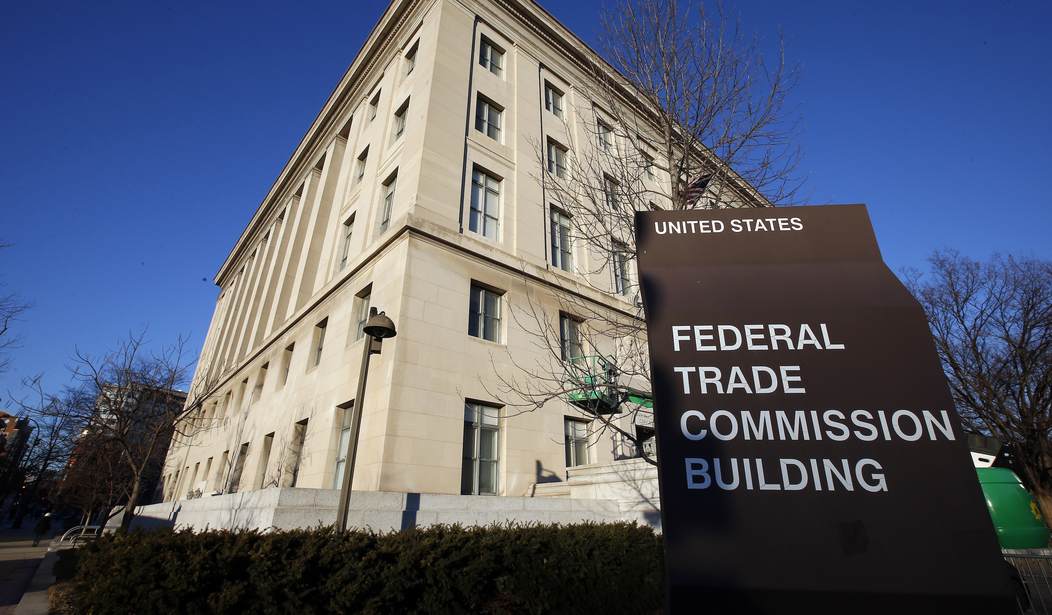I recently weighed in on Townhall and argued that despite repeated defeats in federal courts, the Federal Trade Commission (FTC) is “determined to stifle economic activity regardless of legal constraints.” Since that was published, other thought leaders and economists have raised their voices to oppose the attempted power grab by the agency over private sector activity.
To change the law, the FTC and the Department of Justice (DOJ) proposed a set of guidelines that will slow or stop corporate mergers and acquisitions. These new proposals will make such transactions much tougher, if not impossible, for American corporations.
Many recognize the danger these proposed rules pose to the economy. Dan Mitchell of the Center for Freedom and Prosperity argues that “mergers should be governed by the market, not by politicians.” He makes the case that no matter if a company charges more, the same, or less than their competitors, they will be accused of some type of monopolistic behavior. A company cannot win when the rules are drafted in a manner with presumption of guilt and a predetermined outcome. Mitchell is spot on to point out the change from a consumer welfare standard to a new one will merely empower ideological bureaucrats at the FTC and DOJ to find any reason to stop mergers and acquisitions.
A significant problem with the new guidelines is the language is vague and ambiguous. The authors purposely drafted these terms so politically motivated government officials can use the guidelines to fish for any reason to stop a merger and acquisition - which will result in granting the FTC the power to short circuit the current process that includes rigorous court oversight. The DOJ and FTC’s new guidelines include “several frameworks that the Agencies use to assess the risk that a merger’s effect may be substantially to lessen competition or to tend to create a monopoly” and “explain issues that often arise when the Agencies apply those frameworks in several common settings.” One of the guidelines crafts a new standard that “Mergers Should Not Eliminate Substantial Competition between Firms.” This is far afield of the consumer welfare standard, and the operation of the FTC for decades, which focuses on the goal of antitrust law – to protect consumers.
Recommended
There is no question the FTC is run by a progressive and noted Amazon critic, Lina Khan. Politico reported on June 15, 2021, that after confirmed to be Chair of the FTC, with significant Republican opposition, the “surprise move (gave) progressive Democrats both the reins and a majority at the antitrust agency, spurring hopes among critics of Silicon Valley’s giants for a new assertiveness from the FTC, which is already pursuing an antitrust probe of Amazon and waging a lawsuit that seeks to break up Facebook’s social networking monopoly.” The FTC suffered many losses in the courts, so they modified their strategy and changed the rules in a way to make it far easier to achieve their policy goals - blocking mergers and acquisitions.
The goal of the FTC and DOJ seems to be to intimidate corporations into avoiding mergers and acquisitions through fear of litigation, excessive paperwork, and a long, expensive fight with the Biden administration to complete the transaction. Corporations will have to factor in an increased cost if they want to purchase another company. Scott Lincicome of the Cato Institute argues the new guidelines are “a radical departure from that law and the economics and recent history of mergers in the United States.” Progressives believe all mergers are bad because big corporations are inherently monopolistic predator corporations - no matter what the economic benefits. They have memorialized these ideas into a mechanism to enforce their “Big is Bad” ideology. To be clear, they hate big corporations, yet love big government.
This effort is nothing more than warmed over socialism. Progressives want to grant power to the federal government to have a de facto seat at the table when corporations are making decisions on potential actions in the mergers and acquisitions space. This is a terrible idea because the government does not have skin in the game. If bureaucrats destroy a corporation because of their actions, they will pay no price at all. They will likely be rewarded by progressive activists who despise free markets.
Action can and must be taken. The Republican controlled House of Representatives can defund implementation of these guidelines as part of the appropriations process utilizing their constitutional powers of the purse. Furthermore, the House can conduct further oversight of these specific guidelines to expose them as what they truly are - a Trojan Horse for a socialist agenda attack on free market capitalism.

























Join the conversation as a VIP Member